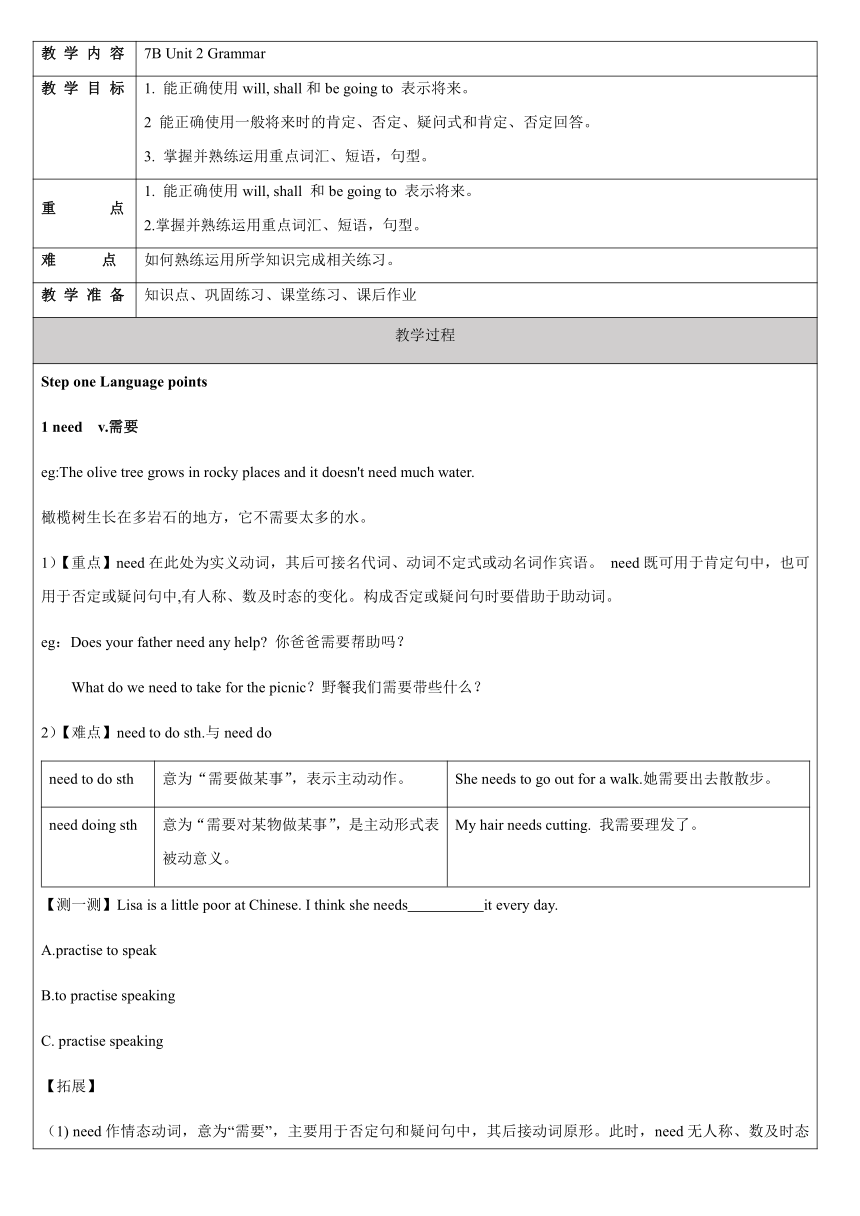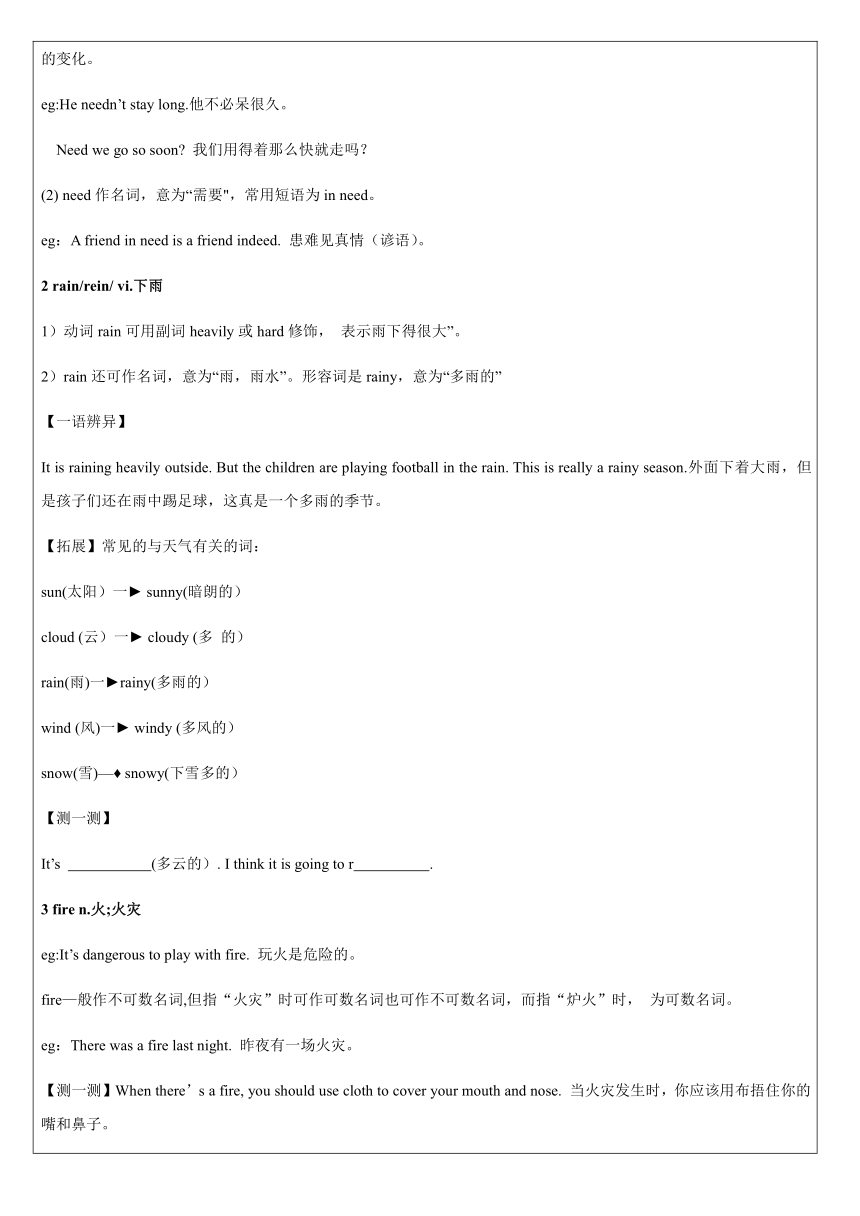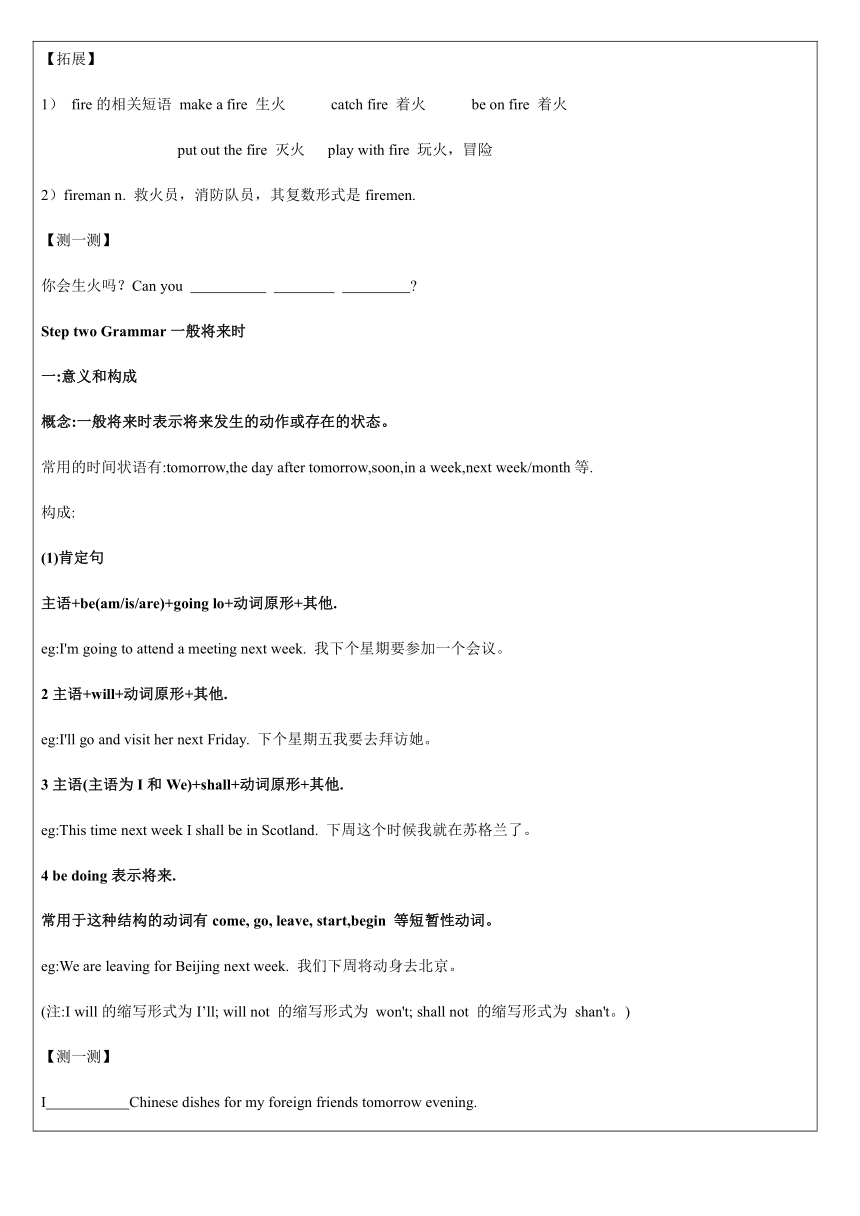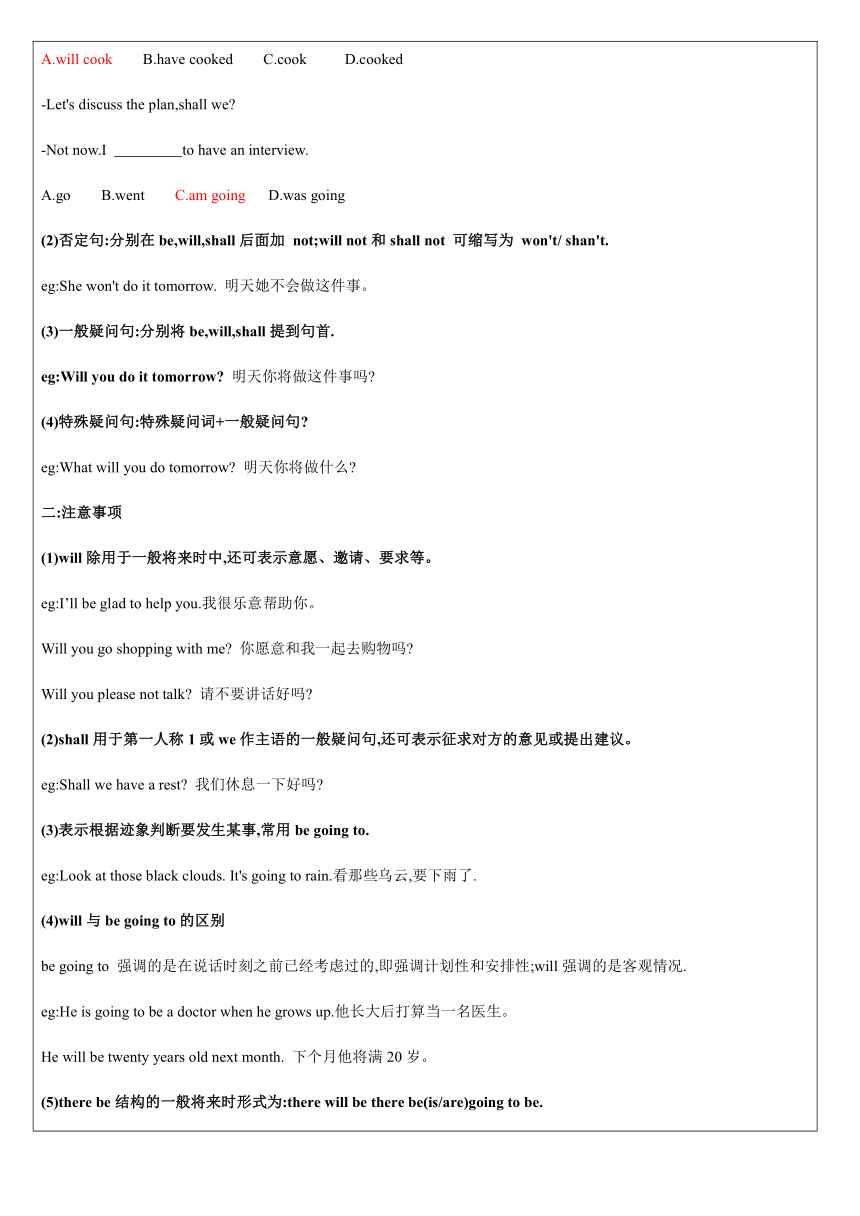Unit 2 Neighbours Grammar 讲义(含答案) 2023-2024学年牛津译林版七年级英语下册
文档属性
| 名称 | Unit 2 Neighbours Grammar 讲义(含答案) 2023-2024学年牛津译林版七年级英语下册 |  | |
| 格式 | docx | ||
| 文件大小 | 28.5KB | ||
| 资源类型 | 教案 | ||
| 版本资源 | 牛津译林版 | ||
| 科目 | 英语 | ||
| 更新时间 | 2024-06-19 17:00:07 | ||
图片预览




文档简介
教 学 内 容 7B Unit 2 Grammar
教 学 目 标 1. 能正确使用will, shall和be going to 表示将来。 2 能正确使用一般将来时的肯定、否定、疑问式和肯定、否定回答。 3. 掌握并熟练运用重点词汇、短语,句型。
重 点 1. 能正确使用will, shall 和be going to 表示将来。 2.掌握并熟练运用重点词汇、短语,句型。
难 点 如何熟练运用所学知识完成相关练习。
教 学 准 备 知识点、巩固练习、课堂练习、课后作业
教学过程
Step one Language points 1 need v.需要 eg:The olive tree grows in rocky places and it doesn't need much water. 橄榄树生长在多岩石的地方,它不需要太多的水。 1)【重点】need在此处为实义动词,其后可接名代词、动词不定式或动名词作宾语。 need既可用于肯定句中,也可用于否定或疑问句中,有人称、数及时态的变化。构成否定或疑问句时要借助于助动词。 eg:Does your father need any help 你爸爸需要帮助吗? What do we need to take for the picnic?野餐我们需要带些什么? 2)【难点】need to do sth.与need do need to do sth意为“需要做某事”,表示主动动作。She needs to go out for a walk.她需要出去散散步。need doing sth意为“需要对某物做某事”,是主动形式表被动意义。My hair needs cutting. 我需要理发了。
【测一测】Lisa is a little poor at Chinese. I think she needs it every day. A.practise to speak B.to practise speaking C. practise speaking 【拓展】 (1) need作情态动词,意为“需要”,主要用于否定句和疑问句中,其后接动词原形。此时,need无人称、数及时态的变化。 eg:He needn’t stay long.他不必呆很久。 Need we go so soon 我们用得着那么快就走吗? (2) need作名词,意为“需要",常用短语为in need。 eg:A friend in need is a friend indeed. 患难见真情(谚语)。 2 rain/rein/ vi.下雨 1)动词rain可用副词heavily或hard修饰, 表示雨下得很大”。 2)rain还可作名词,意为“雨,雨水”。形容词是rainy,意为“多雨的” 【一语辨异】 It is raining heavily outside. But the children are playing football in the rain. This is really a rainy season.外面下着大雨,但 是孩子们还在雨中踢足球,这真是一个多雨的季节。 【拓展】常见的与天气有关的词: sun(太阳)一 sunny(暗朗的) cloud (云)一 cloudy (多 的) rain(雨)一 rainy(多雨的) wind (风)一 windy (多风的) snow(雪)— snowy(下雪多的) 【测一测】 It’s (多云的). I think it is going to r . 3 fire n.火;火灾 eg:It’s dangerous to play with fire. 玩火是危险的。 fire—般作不可数名词,但指“火灾”时可作可数名词也可作不可数名词,而指“炉火”时, 为可数名词。 eg:There was a fire last night. 昨夜有一场火灾。 【测一测】When there’s a fire, you should use cloth to cover your mouth and nose. 当火灾发生时,你应该用布捂住你的嘴和鼻子。 【拓展】 1) fire的相关短语 make a fire 生火 catch fire 着火 be on fire 着火 put out the fire 灭火 play with fire 玩火,冒险 2)fireman n. 救火员,消防队员,其复数形式是firemen. 【测一测】 你会生火吗?Can you Step two Grammar一般将来时 一:意义和构成 概念:一般将来时表示将来发生的动作或存在的状态。 常用的时间状语有:tomorrow,the day after tomorrow,soon,in a week,next week/month等. 构成: (1)肯定句 主语+be(am/is/are)+going lo+动词原形+其他. eg:I'm going to attend a meeting next week. 我下个星期要参加一个会议。 2主语+will+动词原形+其他. eg:I'll go and visit her next Friday. 下个星期五我要去拜访她。 3主语(主语为I和We)+shall+动词原形+其他. eg:This time next week I shall be in Scotland. 下周这个时候我就在苏格兰了。 4 be doing表示将来. 常用于这种结构的动词有come, go, leave, start,begin 等短暂性动词。 eg:We are leaving for Beijing next week. 我们下周将动身去北京。 (注:I will的缩写形式为I’ll; will not 的缩写形式为 won't; shall not 的缩写形式为 shan't。) 【测一测】 I Chinese dishes for my foreign friends tomorrow evening. A.will cook B.have cooked C.cook D.cooked -Let's discuss the plan,shall we -Not now.I to have an interview. A.go B.went C.am going D.was going (2)否定句:分别在be,will,shall后面加 not;will not和shall not 可缩写为 won't/ shan't. eg:She won't do it tomorrow. 明天她不会做这件事。 (3)一般疑问句:分别将be,will,shall提到句首. eg:Will you do it tomorrow 明天你将做这件事吗 (4)特殊疑问句:特殊疑问词+一般疑问句 eg:What will you do tomorrow 明天你将做什么 二:注意事项 (1)will除用于一般将来时中,还可表示意愿、邀请、要求等。 eg:I’ll be glad to help you.我很乐意帮助你。 Will you go shopping with me 你愿意和我一起去购物吗 Will you please not talk 请不要讲话好吗 (2)shall用于第一人称1或we作主语的一般疑问句,还可表示征求对方的意见或提出建议。 eg:Shall we have a rest 我们休息一下好吗 (3)表示根据迹象判断要发生某事,常用be going to. eg:Look at those black clouds. It's going to rain.看那些乌云,要下雨了. (4)will与be going to的区别 be going to 强调的是在说话时刻之前已经考虑过的,即强调计划性和安排性;will强调的是客观情况. eg:He is going to be a doctor when he grows up.他长大后打算当一名医生。 He will be twenty years old next month. 下个月他将满20岁。 (5)there be结构的一般将来时形式为:there will be there be(is/are)going to be. eg:There is going to be a party this weekend. 这个周末将有一次聚会。 【测一测】 There a basketball match this weekend. A.will have B.is going to be C.is going to have 随堂练习 一、用所给词的适当形式填空 1.His uncle (be)back in a week. 2. your mother (see)the doctor tomorrow 3.Shall we (meet)at the school gate tomorrow morning 4.There (be)a meeting in our school tomorrow afternoon. 5.She (water)the flowers the day after tomorrow. 二、单项选择 6.-Where is your brother -He has gone to Beijing.He back in three days. A.will come B.comes C.has come D.came 7.Daniel and Kitty food this afternoon. A.is going to buy B.are going to buy C.shall buy D.will to buy 8.I hope Tim can come to my birthday party.Then we a much happier time. A.have B.had C.will have D.has 9.-Which team do you think the game -Hard to say. There are still ten minutes before it ends. A.won B.win C.will win D.wins 10.There a meeting the day after tomorrow. A.is going to be B.will have C.is going to have D.has 三、根据要求完成句子 11.Mum will do some shopping the day after tomorrow.(改为否定句) Mum shopping the day after tomorrow. 12.Bill is going to watch TV this afternoon.(改为一般疑问句) Bill to watch TV this afternoon 13.We shall meet at the school gate.(对画线部分提问) we meet 14.My cousin will fly to Shanghai next week.(对画线部分提问) What your cousin next week 15.There was a meeting in the hall yesterday afternoon. (用next Monday改写句子) There a meeting in the hall next Monday. 四、根据汉语意思完成句子 16她明天晚上给你回电话。 She tomorrow evening. 17.天如此阴,我想天要下雨了。 It is so .I think it 18.你明天要去看病吗? you see the doctor tomorrow 19.我们后天去看电影,好吗? go to the cinema 20.著名作家格林先生,下周要来我们学校参观。 Mr Green,a famous writer, our school next week.
皿.单元语法精讲
一,1.will be 点拨:本题用寻找题眼法。由题干中in a week 可知用一般将来时。
2.Will;see 点拨:本题用寻找题眼法。 由题干中tomorrow可知用一般将来时。
3.meet 点拨:本题用寻找题眼法。由题干中 Shall 可知动词用原形。
4.will/is going to be 点拨:本题用寻找题眼法。 由 tomorrow afternoon可知用一般将来时,there be 结构的一般将来时形式为there will be 或 there be(is/are)goingto beo
5.will water/is going to water
ニ.6.A 点拨:本题用寻找题眼法。由时间状语“in three days”可知,本句为一般将来时。 故选A。
7.B 点拨:本题用寻找题眼法。由题干中this afternoon 可知用一般将来时,主语为复数形式且为第三人称,故选B。
8.C 点拨:本题用逻辑推理法。根据句意“我希望 Tim可以来参加我的生日聚会。那么我们就会玩得快乐得多。”可知,生日聚会还没来到,所以用一般将来时。
9.C 点拨:本题用语境判断法。 考查时态的用法。 由答句“ 很难说,离比赛结束还有十分钟。”可推出问句句意为“你认为哪支队伍将会赢得比赛 ”此处应该用一般将来时,所以选Co
10.A 点拨:根据 there be 结构的一般将来
时形式可排除B、C、D三项,故选A.
三,11.won't do any
12.Is;going 点拨:本题用转化法。含有be
going to 结构的句子改为一般疑问句时将be 动词提前。
13.Where shall
14.will;do
15.is going to be
四16.will call you back
17.cloudy;is going to rain
18.Are;going to
19.Shall we;the day after tomorrow20.will come to visit
教 学 目 标 1. 能正确使用will, shall和be going to 表示将来。 2 能正确使用一般将来时的肯定、否定、疑问式和肯定、否定回答。 3. 掌握并熟练运用重点词汇、短语,句型。
重 点 1. 能正确使用will, shall 和be going to 表示将来。 2.掌握并熟练运用重点词汇、短语,句型。
难 点 如何熟练运用所学知识完成相关练习。
教 学 准 备 知识点、巩固练习、课堂练习、课后作业
教学过程
Step one Language points 1 need v.需要 eg:The olive tree grows in rocky places and it doesn't need much water. 橄榄树生长在多岩石的地方,它不需要太多的水。 1)【重点】need在此处为实义动词,其后可接名代词、动词不定式或动名词作宾语。 need既可用于肯定句中,也可用于否定或疑问句中,有人称、数及时态的变化。构成否定或疑问句时要借助于助动词。 eg:Does your father need any help 你爸爸需要帮助吗? What do we need to take for the picnic?野餐我们需要带些什么? 2)【难点】need to do sth.与need do need to do sth意为“需要做某事”,表示主动动作。She needs to go out for a walk.她需要出去散散步。need doing sth意为“需要对某物做某事”,是主动形式表被动意义。My hair needs cutting. 我需要理发了。
【测一测】Lisa is a little poor at Chinese. I think she needs it every day. A.practise to speak B.to practise speaking C. practise speaking 【拓展】 (1) need作情态动词,意为“需要”,主要用于否定句和疑问句中,其后接动词原形。此时,need无人称、数及时态的变化。 eg:He needn’t stay long.他不必呆很久。 Need we go so soon 我们用得着那么快就走吗? (2) need作名词,意为“需要",常用短语为in need。 eg:A friend in need is a friend indeed. 患难见真情(谚语)。 2 rain/rein/ vi.下雨 1)动词rain可用副词heavily或hard修饰, 表示雨下得很大”。 2)rain还可作名词,意为“雨,雨水”。形容词是rainy,意为“多雨的” 【一语辨异】 It is raining heavily outside. But the children are playing football in the rain. This is really a rainy season.外面下着大雨,但 是孩子们还在雨中踢足球,这真是一个多雨的季节。 【拓展】常见的与天气有关的词: sun(太阳)一 sunny(暗朗的) cloud (云)一 cloudy (多 的) rain(雨)一 rainy(多雨的) wind (风)一 windy (多风的) snow(雪)— snowy(下雪多的) 【测一测】 It’s (多云的). I think it is going to r . 3 fire n.火;火灾 eg:It’s dangerous to play with fire. 玩火是危险的。 fire—般作不可数名词,但指“火灾”时可作可数名词也可作不可数名词,而指“炉火”时, 为可数名词。 eg:There was a fire last night. 昨夜有一场火灾。 【测一测】When there’s a fire, you should use cloth to cover your mouth and nose. 当火灾发生时,你应该用布捂住你的嘴和鼻子。 【拓展】 1) fire的相关短语 make a fire 生火 catch fire 着火 be on fire 着火 put out the fire 灭火 play with fire 玩火,冒险 2)fireman n. 救火员,消防队员,其复数形式是firemen. 【测一测】 你会生火吗?Can you Step two Grammar一般将来时 一:意义和构成 概念:一般将来时表示将来发生的动作或存在的状态。 常用的时间状语有:tomorrow,the day after tomorrow,soon,in a week,next week/month等. 构成: (1)肯定句 主语+be(am/is/are)+going lo+动词原形+其他. eg:I'm going to attend a meeting next week. 我下个星期要参加一个会议。 2主语+will+动词原形+其他. eg:I'll go and visit her next Friday. 下个星期五我要去拜访她。 3主语(主语为I和We)+shall+动词原形+其他. eg:This time next week I shall be in Scotland. 下周这个时候我就在苏格兰了。 4 be doing表示将来. 常用于这种结构的动词有come, go, leave, start,begin 等短暂性动词。 eg:We are leaving for Beijing next week. 我们下周将动身去北京。 (注:I will的缩写形式为I’ll; will not 的缩写形式为 won't; shall not 的缩写形式为 shan't。) 【测一测】 I Chinese dishes for my foreign friends tomorrow evening. A.will cook B.have cooked C.cook D.cooked -Let's discuss the plan,shall we -Not now.I to have an interview. A.go B.went C.am going D.was going (2)否定句:分别在be,will,shall后面加 not;will not和shall not 可缩写为 won't/ shan't. eg:She won't do it tomorrow. 明天她不会做这件事。 (3)一般疑问句:分别将be,will,shall提到句首. eg:Will you do it tomorrow 明天你将做这件事吗 (4)特殊疑问句:特殊疑问词+一般疑问句 eg:What will you do tomorrow 明天你将做什么 二:注意事项 (1)will除用于一般将来时中,还可表示意愿、邀请、要求等。 eg:I’ll be glad to help you.我很乐意帮助你。 Will you go shopping with me 你愿意和我一起去购物吗 Will you please not talk 请不要讲话好吗 (2)shall用于第一人称1或we作主语的一般疑问句,还可表示征求对方的意见或提出建议。 eg:Shall we have a rest 我们休息一下好吗 (3)表示根据迹象判断要发生某事,常用be going to. eg:Look at those black clouds. It's going to rain.看那些乌云,要下雨了. (4)will与be going to的区别 be going to 强调的是在说话时刻之前已经考虑过的,即强调计划性和安排性;will强调的是客观情况. eg:He is going to be a doctor when he grows up.他长大后打算当一名医生。 He will be twenty years old next month. 下个月他将满20岁。 (5)there be结构的一般将来时形式为:there will be there be(is/are)going to be. eg:There is going to be a party this weekend. 这个周末将有一次聚会。 【测一测】 There a basketball match this weekend. A.will have B.is going to be C.is going to have 随堂练习 一、用所给词的适当形式填空 1.His uncle (be)back in a week. 2. your mother (see)the doctor tomorrow 3.Shall we (meet)at the school gate tomorrow morning 4.There (be)a meeting in our school tomorrow afternoon. 5.She (water)the flowers the day after tomorrow. 二、单项选择 6.-Where is your brother -He has gone to Beijing.He back in three days. A.will come B.comes C.has come D.came 7.Daniel and Kitty food this afternoon. A.is going to buy B.are going to buy C.shall buy D.will to buy 8.I hope Tim can come to my birthday party.Then we a much happier time. A.have B.had C.will have D.has 9.-Which team do you think the game -Hard to say. There are still ten minutes before it ends. A.won B.win C.will win D.wins 10.There a meeting the day after tomorrow. A.is going to be B.will have C.is going to have D.has 三、根据要求完成句子 11.Mum will do some shopping the day after tomorrow.(改为否定句) Mum shopping the day after tomorrow. 12.Bill is going to watch TV this afternoon.(改为一般疑问句) Bill to watch TV this afternoon 13.We shall meet at the school gate.(对画线部分提问) we meet 14.My cousin will fly to Shanghai next week.(对画线部分提问) What your cousin next week 15.There was a meeting in the hall yesterday afternoon. (用next Monday改写句子) There a meeting in the hall next Monday. 四、根据汉语意思完成句子 16她明天晚上给你回电话。 She tomorrow evening. 17.天如此阴,我想天要下雨了。 It is so .I think it 18.你明天要去看病吗? you see the doctor tomorrow 19.我们后天去看电影,好吗? go to the cinema 20.著名作家格林先生,下周要来我们学校参观。 Mr Green,a famous writer, our school next week.
皿.单元语法精讲
一,1.will be 点拨:本题用寻找题眼法。由题干中in a week 可知用一般将来时。
2.Will;see 点拨:本题用寻找题眼法。 由题干中tomorrow可知用一般将来时。
3.meet 点拨:本题用寻找题眼法。由题干中 Shall 可知动词用原形。
4.will/is going to be 点拨:本题用寻找题眼法。 由 tomorrow afternoon可知用一般将来时,there be 结构的一般将来时形式为there will be 或 there be(is/are)goingto beo
5.will water/is going to water
ニ.6.A 点拨:本题用寻找题眼法。由时间状语“in three days”可知,本句为一般将来时。 故选A。
7.B 点拨:本题用寻找题眼法。由题干中this afternoon 可知用一般将来时,主语为复数形式且为第三人称,故选B。
8.C 点拨:本题用逻辑推理法。根据句意“我希望 Tim可以来参加我的生日聚会。那么我们就会玩得快乐得多。”可知,生日聚会还没来到,所以用一般将来时。
9.C 点拨:本题用语境判断法。 考查时态的用法。 由答句“ 很难说,离比赛结束还有十分钟。”可推出问句句意为“你认为哪支队伍将会赢得比赛 ”此处应该用一般将来时,所以选Co
10.A 点拨:根据 there be 结构的一般将来
时形式可排除B、C、D三项,故选A.
三,11.won't do any
12.Is;going 点拨:本题用转化法。含有be
going to 结构的句子改为一般疑问句时将be 动词提前。
13.Where shall
14.will;do
15.is going to be
四16.will call you back
17.cloudy;is going to rain
18.Are;going to
19.Shall we;the day after tomorrow20.will come to visit
